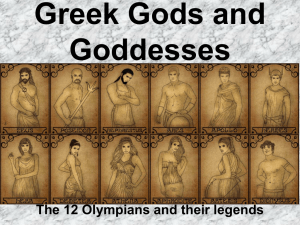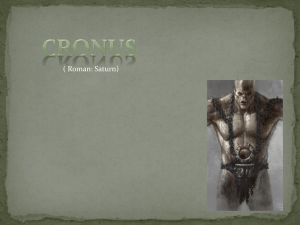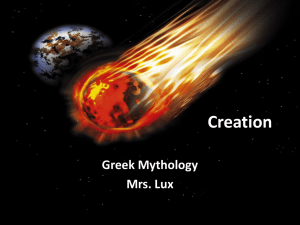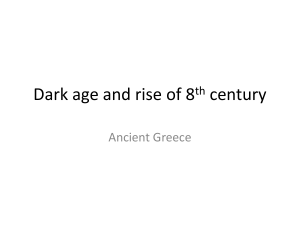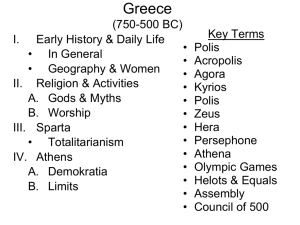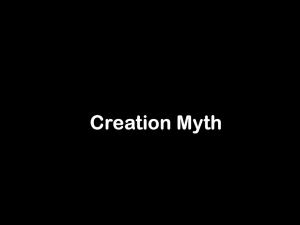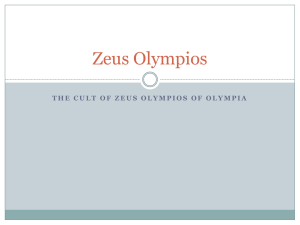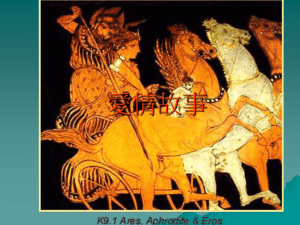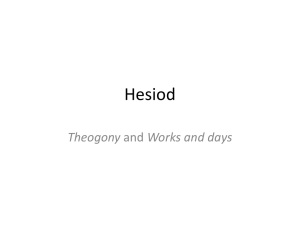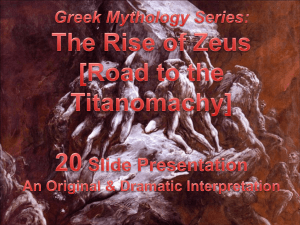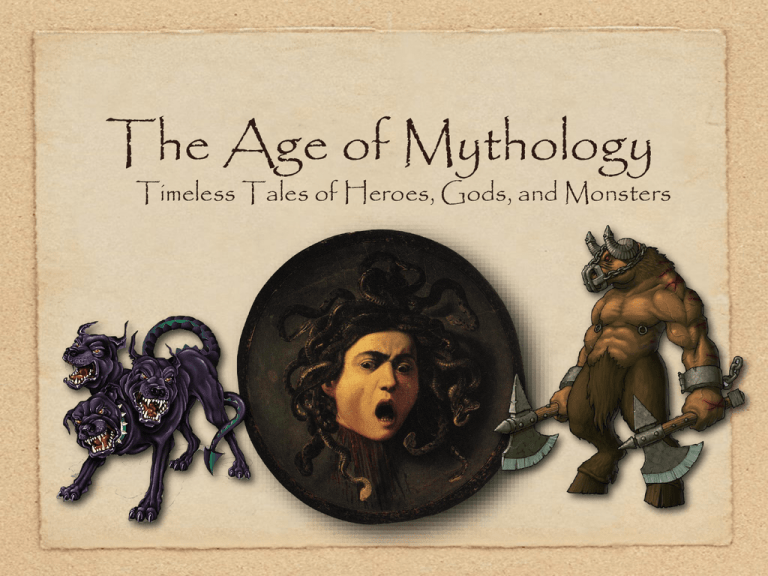
The Age of Mythology
Timeless Tales of Heroes, Gods, and Monsters
Mythology
•
•
Definition: a usually traditional story of
events that serves to unfold part of the world
view of a people or explain a practice, belief,
or natural phenomenon . Myths often involve
divine, supernatural, and/or heroic characters.
Or in other words…
Mythology
•
Definition #2: A collection of fictional
stories involving the actions of gods,
goddesses and other imaginary characters,
intended to explain the unexplainable.
Oral Tradition
•
•
Definition: the practice of passing along
stories, tales, and folklore by word of mouth
Oral tradition is responsible for many of the
“inconsistencies” of ancient mythology.
Legends
•
•
•
Definition: fictional stories loosely based
upon real/historical people and events.
Also known as “tall-tales”
Are rooted in facts, but stories have been
changed through the years…WHY?
Fables
•
•
Definition: A brief story, often containing
animal characters that teaches a lesson or
moral
Fables deal with “useful truth”
Fantasy
•
•
Definition: highly imaginative
writing that contains elements not
found in real life
Many science fiction and fantasy
books, movies and comic books are
based upon the style and manner of
myths.
Classical Greek
Mythology
•
•
Definition: A collection of stories about a
set of gods, based upon oral tradition, as told
and recorded by the ancient Greeks
Myths served as entertainment, a sense of
national/regional pride, and religious
education
“The Classicists”
•
•
•
Greek mythology existed for hundreds of
years before these stories were ever recorded
with written words.
The scholars/poets who recorded the myths
are known as “classicists.”
The major classicists of Greek Mythology
include Virgil, Homer, and Ovid.
Categories of Myths
•
•
•
Myths of creation: these explain the
beginning of time, space, and man
Myths of explanation: these explain the great
questions of the universe
Myths of morality: these teach lessons and
reinforce cultural morality
The Importance of Myths
• Myths were critical to the Ancient Greeks
• These stories touched all aspects of
Greek life, including their art, music,
architecture, military endeavors, religion,
and education.
Why Study Mythology?
• Greek myths are the foundation for the
arts as we know it, including: movies,
television, commercial products, sports,
music, and comic books.
• A knowledge of Greek mythology
enhances a person’s ability to understand
and appreciate the world as a whole.
Mythology: A Brief Timeline
• The beginning: according to popular belief
• Uranus was the “First One”, and he
created the universe.
• Uranus created and married Gaia,
otherwise known as “Mother Earth.”
• They lived on Mt. Olympus
• Uranus and Gaia had many children:
• Some were human-like giants, called the
“Titans”
• Some were hideous, disfigured monsters
• The Titans lived for many years under
Uranus’s cruel reign
• Uranus’s most powerful son would soon
challenge his rule.
• Cronus killed his cruel father and
assumed his role as “king of the Titans.”
• Before Uranus died, he predicted that
Cronus would be killed by one of his sons,
just as he had been.
• What is the logical solution to this
problem?
• Cronus married his sister, Rhea, and had:
• -Three daughters: Hestia, Demeter, Hera
• -Three sons: Posiedon, Hades, and Zeus
• These offspring were considered Titans, but
would later become the gods and goddesses of
Greek Mythology
• Because he feared his sons, Cronus ate
his first two sons whole
• Fed up with his baby-gobbling, Rhea gave
birth to her third son in secret
• Rhea dressed a boulder up as a baby and
Cronus ate the rock unknowingly
• Zeus was sent as an infant to be raised in
secret by human shephards
“Cronus Devours His Children”
• Zeus returned to Mt. Olympus as a young
man and poisoned Cronus
• Cronus vomited up brothers Poseidon and
Hades
• Zeus was celebrated as a hero
• An epic battle ensues between Cronus
and his sons for the right to rule Mt.
Olympus and the universe.
The Great Battle!
• Cronus is assisted in battle by his Titan
brothers
• Zeus and his brothers are assisted by the
monsters Cronus had abused and tortured
for years in captivity.
• These monsters included the Cyclopes (3)
and the Hundred-Handed Ones (3)
Mythology and Classic Art
•
The Battle Between the Gods and the Titans by Wtewael Art Institute of Chicago,
Chicago
Cronus is Defeated!
• The three sons roll dice to divide Cronus’
kingdom
• Poseidon wins, but elects to choose
second, knowing that naïve Zeus would
choose the empty sky.
• Poseidon is correct, and Zeus chooses
unwisely.
• Hades is left to bitterly receive “leftovers.”
Enter the Gods…
• Magically and mysteriously, the children of
Cronus become immortal, and become
gods and goddesses.
• Mythology offers no explanation for this
important transformation!
The Pantheon
• There are many gods, goddesses, demigods (half-gods) and supernatural beings
in Greek Mythology.
• The twelve main gods and goddesses are
known as the Pantheon.
Zeus
Zeus:
• King of the gods, ruler of Mt. Olympus
• Also god of lightning
• Was a powerful and aggressive ruler
• Struck Earth with lightning bolt when upset
• Waged constant war with wife Hera
• Cheated on wife countless times, and had
numerous children with mortals, gods, and
other creatures
Zeus (continued)
• Was a master of disguise, which aided him
in his philandering
• Was a complex character:
capable of
unspeakable acts of immorality and
occasional acts of mercy
Hera
HERA
• Queen of immortals, goddess of marriage
and childbirth
• Unhappy wife of Zeus
• Disapproved of Zeus’ constant cheating
• Held grudges against Zeus’ “children”
• Often punished Zeus with childish pranks
and vengeful schemes
• Associated with the peacock
Poseidon
Poseidon
• God of water
• God of horses as well
• Ruled over seas, oceans, rivers and all the
sea creatures
• Did not live in the lost city of Atlantis
• Invented many of the fish and sea
monsters of mythology
• Created the horse for Demeter (*)
Demeter
Demeter
• Goddess of the harvest, plants, farming
• One of Zeus’ favorite females (also sister)
• Poseidon also loved Demeter
• Mother of Persephone
• Responsible for the all-important growing
season (most Greeks were farmers)
Athena
Athena
• Goddess of wisdom and warfare
• Zeus daughter out of wedlock
• Mother was Metis, a Titaness
• Zeus became paranoid that his child would
harm him, so he eats her whole.
• Zeus developed a splitting headache
• Hephaestus split his head open with a
chisel, and…
The “Rebirth” of
Athena
• Athena jumped out of Zeus skull, full-grown
and wearing battle armor.
• Often associated with the owl
• Carried a shield adorned with the head of
Medusa, the Gorgon
• One of the most popular and respected
immortals
• Athens, Greece is named for her
Apollo
APoll0
• God of the sun, art, music, math,
moderation and poetry
• Artemis’ twin brother
• Was especially talented but arrogant
• Often engaged in unfair competitions with
mortals
• Regarded as Zeus’ most powerful son
• Known for his bloated self-esteem
The Flaying of
Marsyas
Artemis
Artemis
• Goddess of hunting, sport, and the moon
• Born of Zeus and Leto (a nymph)
• Was Zeus’ favorite daughter
• Zeus granted Artemis three wishes to show
her his affection
• Many of Zeus’ children were jealous of
Artemis’ attention and gifts
Artemis (continued)
1) Artemis wished for a silver hunting bow
and arrow.
2) Artemis desired to be known by many
nicknames.
3) Artemis desired to stay forever young.
•
*Artemis remains chaste for eternity. She
endures countless advances, though.
Hades
HADES
• God of the Underworld
• Was an aggressive, moody and selfish god
• Often depicted inaccurately as the
“antagonist” of mythology
• “Hades” refers to both the character and
the region of the Underworld itself
Hades (continued)
• Ruled over the three regions of Underworld:
• Tartarus: dark field bordered by hideous, animated
trees, filled with lost souls
• River Styx:
raging river, often depicted as lava or
blood, that marked the entrance to the Underworld.
• Also called the “River of Souls”
Hades (continued)
• Elysian Fields:
a barren wasteland where
the good dead reside
• (*) Isle of the Blessed:
blissful paradise
where only the most priviledged mortals
went upon dying
Hades (continued)
• Lived with his kidnapped wife, Persephone
• Cerberus (three-headed dog) guarded the
entrance to the Underworld
• Despite being an important mythological
character, Hades only left the Underworld a
handful of times.
Hephaestus
Hephaestus (Vulcan)
• God of iron work, blacksmithing,
mechanics and manual labor
• Son of Zeus and Hera
• Was born ugly and fitful
• Hera kicked him from Mt. Olympus
• Was reinstated by Hera for his masterful
skill of jewelry-making
• Was ugly, crippled and hideous
Hephaestus Strikes
Gold…
• Married to Aphrodite, the most beautiful of
all goddesses
• Had no children with his wife
• Endured Aphrodite’s many affairs and
constant flirtations
• Was emotionally scarred by Aphrodite’s
affair with Ares, the god of war
52
Aphrodite
• Goddess of beauty, love, and sex
• Most beautiful of all immortals
• Aphrodite has a sketchy and controversial
past
• Due to oral tradition and censorship, the
tales of Aphrodite have changed
considerably through the years
Aphrodite’s Creation
• Version #1: Aphrodite was the son of Zeus
and a Dione
• Version #2: Aphrodite was born of Zeus
and the daughter of one of his arch
enemies
• But both of these stories are less-thanaccurate twists on the real version…
The Real Creation of Aphrodite
• Aphrodite was born from the death of
Uranus
• Cronus castrated his father before death,
and threw the “part” into the ocean
• From the bubbling, boiling, bloody foam,
Aphrodite appeared
• She was accompanied at birth by sea
nymphs and doves
• Often depicted as having hatched from a
seashell
Aphrodite (con’t.)
• Discovered by fishermen and taken to Mt.
Olympus as a gift to Zeus
• Hera, fearing a relationship between Zeus
and Aphrodite, insisted that she marry
Hephaestus, her ugliest child
• Aphrodite serves as a constant temptation
for gods and mortals alike.
• Her name literally means “from the foam”
Ares
•
•
•
•
•
•
Ares
God of warfare
Was violent, aggressive, and unlikeable
Was Hera and Zeus’s most despised
son
Had an awkward love affair with
Aphrodite
Was actually a coward (traitor)
Was feared, but not respected by
Greeks
Hermes
Hermes
• Messenger god, god of gambling, theivery
and trickery
• Has a sketchy creation:
–Zeus child with a nymph
–Zeus child with a goddess (unnamed)
–Son of two enchanted mortals
• *Oral tradition is contributed to the many
different creations of Hermes
Hermes
• Considered Zeus’ “toadie”
• Messenger and courier of the gods
• Only mythological character with ability to
enter and leave Underworld freely
• Ran on air with a
pair of special winged
sandals called “thalia”
• “Thalia” were a gift from Athena

